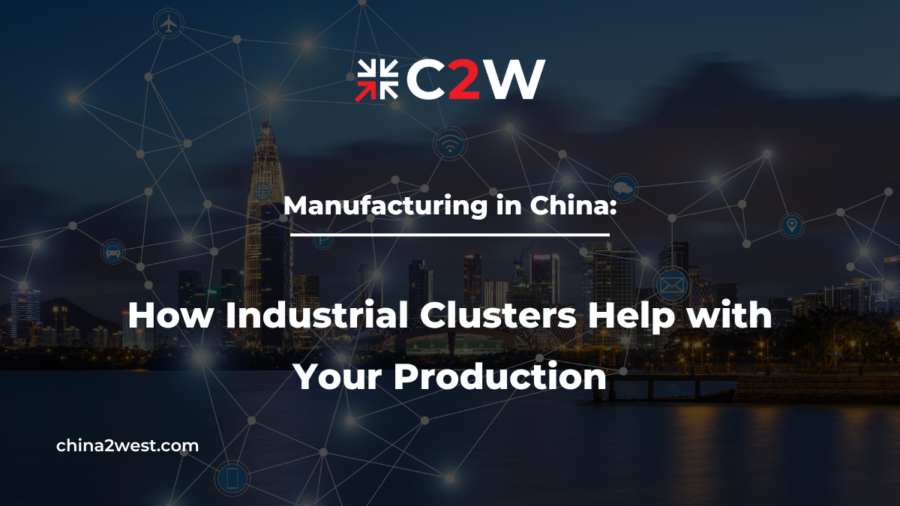Manufacturing in China has become an attractive option for many businesses around the world due to the country’s large pool of skilled labor, low manufacturing costs, and efficient supply chain management. More importantly, the country has well-established industrial clusters that can help different businesses satisfy their production needs.
Regional specializations have always existed in China. In recent times, China has achieved a breakthrough in manufacturing efficiency by setting up immense industrial clusters dedicated to a particular sector or product. Boasting a fully developed and ever-growing structure, these industrial clusters can assist with satisfying various demands. Therefore, let us dive deeper and uncover more about these clusters and their functions.
What is an Industrial Cluster?
An industrial cluster represents an industrial grouping formed by a large number of interconnected businesses of the same sector that interact and collaborate within a specified geographic region. It consists of manufacturers, wholesalers, distributors as well as government agencies, and associated institutions in a particular industry, such as electronics, textiles, or automotive manufacturing.
Different institutions have their functionalities, like providing resources, raw materials, commodities, information, infrastructure, and technical support, to perfect the supply chain and expand the industry.
One might say that the industrial cluster is a network of manufacturing and economic relationships that create a competitive advantage for the related firms in a particular region. This advantage then becomes an enticement for similar industries and suppliers to those industries to develop or relocate to a region.
Examples of Industrial Clusters in China
China, a global economic powerhouse, boasts a remarkable landscape of diverse and highly specialized industrial clusters, each representing a focal point for the country’s manufacturing prowess. These bustling centers of production bring together businesses, suppliers, and skilled labor, fostering innovation and efficiency within their respective industries. Here, we present some notable examples of China’s well-known industrial clusters, each leaving an indelible mark on the world market.
Yiwu – Small Commodities Center
Yiwu, strategically situated in central Zhejiang, has emerged as a pivotal hub for the globalization of small commodities. With a vast array of products, ranging from household items to fashion accessories and everything in between, Yiwu has become a dominant force in international trade. This bustling city has successfully exported its diverse range of goods to an impressive 233 regions and countries, making it a driving force behind China’s export-oriented economy.
Shenzhen – The Electronics Hub
The Pearl River Delta, a renowned industrial hub located in Guangdong Province, boasts a renowned electronics industry. Among its many gems, Shenzhen, stands out as the Silicon Valley of China, boasting a dazzling cluster of major electronics companies. Giants like Huawei, ZTE, and DJI have chosen Shenzhen as their headquarters, solidifying its position as a global tech innovation hub.
Chenghai – Toy Production Base
Chenghai District, a district of the city of Shantou, Guangdong Province, is the major toy manufacturing cluster. The region was listed as “China’s toy and gift capital” by the China National Light Industry Council in 2013. Drawing upon decades of experience and a strong spirit of creativity, the region has captured the imagination of children worldwide with its diverse array of toys.
Cixi – Small Home Appliances Hub
From its modest beginnings as a small market town, Cixi has emerged as the indisputable “capital of small home appliances” in China. Nestled near Ningbo, Zhejiang Province in Eastern China, this county-level city has carved a niche for itself in the home appliance industry, captivating consumers both domestically and globally.
Xuchang – The Wigs Marvel
Nestled in Henan Province, Xuchang has earned its esteemed title as the undisputed “China’s capital of wigs.” This vibrant city has become the epicenter of wig manufacturing in the country, making significant contributions to China’s manufacturing prowess and enriching the lives of people worldwide with its reliable, innovative, and sustainable products.
Guangzhou – The Textile Mecca
The bustling metropolis of Guangzhou holds the distinction of being one of the world’s leading textile manufacturing hubs. This industrial cluster is a bustling hive of activity, producing a wide spectrum of fabrics, garments, and textiles, catering to diverse global markets. With an intricate supply chain and a skilled workforce, Guangzhou’s textile industry plays a crucial role in the fashion world and is a driving force behind international trade in the realm of clothing and textiles.
Advantages of Industrial Cluster
Industrial clusters offer numerous advantages that foster economic growth, innovation, and competitiveness. These benefits arise from the concentration of interconnected businesses and resources within a specific geographic area, creating a mutually beneficial ecosystem. Here are some of the key advantages of industrial clusters:
Specialization and Expertise
Industrial clusters often focus on specific industries or product categories. This concentration of expertise allows companies within the cluster to develop specialized skills, knowledge, and techniques related to their particular domain. As a result, manufacturers can benefit from the shared expertise and resources, leading to higher-quality products and streamlined production.
Suppliers Network
China’s industrial clusters are not limited to manufacturing companies alone. They also encompass a network of suppliers and service providers that support the production process. This integrated supply chain reduces lead times, lowers costs, and ensures a steady flow of materials and components, enhancing the overall efficiency of your production.
Economies of Scale
Large industrial clusters in China facilitate economies of scale. When numerous manufacturers producing similar goods are located close together, they can pool resources for bulk purchasing of raw materials and negotiate better deals with suppliers. This scale advantage often translates to cost savings, making production in China more cost-effective compared to other regions.
Technological Advancements
Industrial clusters encourage healthy competition among companies to stay at the forefront of technological advancements. As businesses strive to outdo one another, they invest in research and development, leading to innovation and the adoption of cutting-edge technologies. As a manufacturer, you can benefit from access to the latest tools and methodologies within these clusters.
Labor Pool
China’s industrial clusters attract a skilled and specialized labor force due to the concentration of job opportunities in specific industries. The availability of a trained workforce can significantly benefit your production by reducing training costs and enabling faster skill acquisition.
Infrastructure and Government Support
The Chinese government has actively supported the development of industrial clusters by investing in infrastructure, offering incentives, and creating a business-friendly environment. This support can translate into improved transportation, logistics, and access to resources, which can positively impact your manufacturing operations.
Work with a Certificated Manufacturer in China
In conclusion, industrial clusters in China offer a plethora of advantages for businesses around the world seeking cost-effective and efficient production solutions. By establishing your production within these industrial clusters, you gain access to a diverse and specialized supply chain, reducing lead times and production costs significantly. The abundance of skilled labor, expertise, and resources within these clusters further enhances your ability to develop high-quality products at a competitive price point.
If you are considering outsourcing your project to China, look no further than China 2 West. We have developed to be a famous one-stop-shop manufacturing consultancy from product sourcing and manufacturing to QC inspection and distribution in the Greater Bay Area in Southern China. If you want to know more about how we can help your project, don’t hesitate to contact us today.


